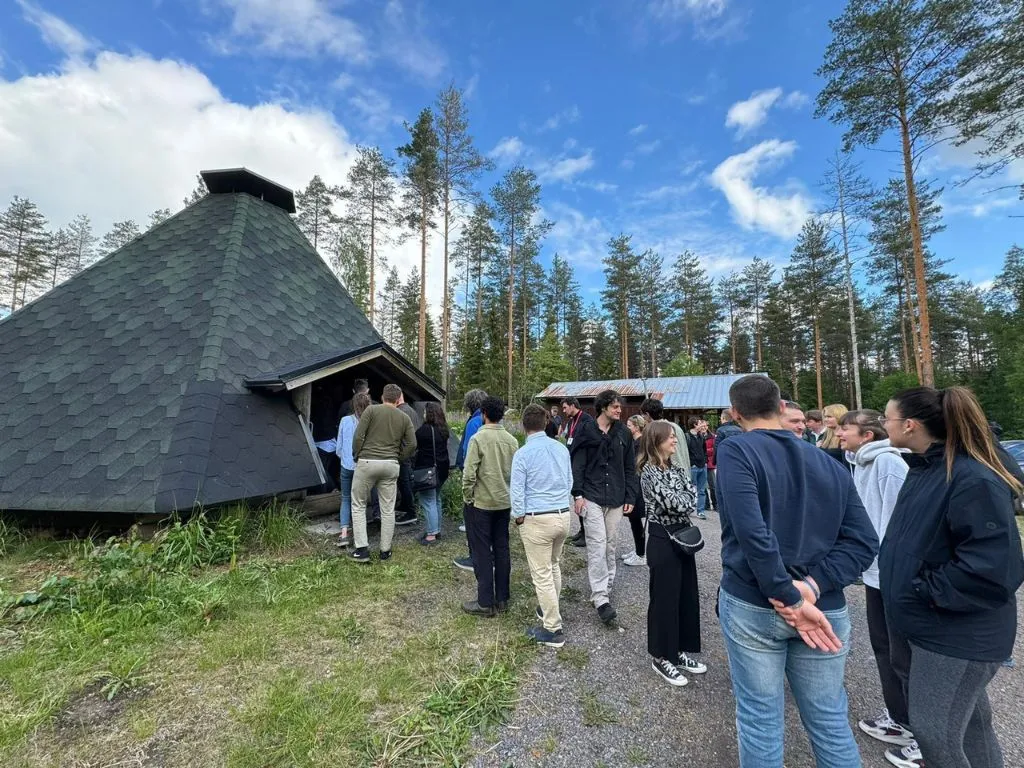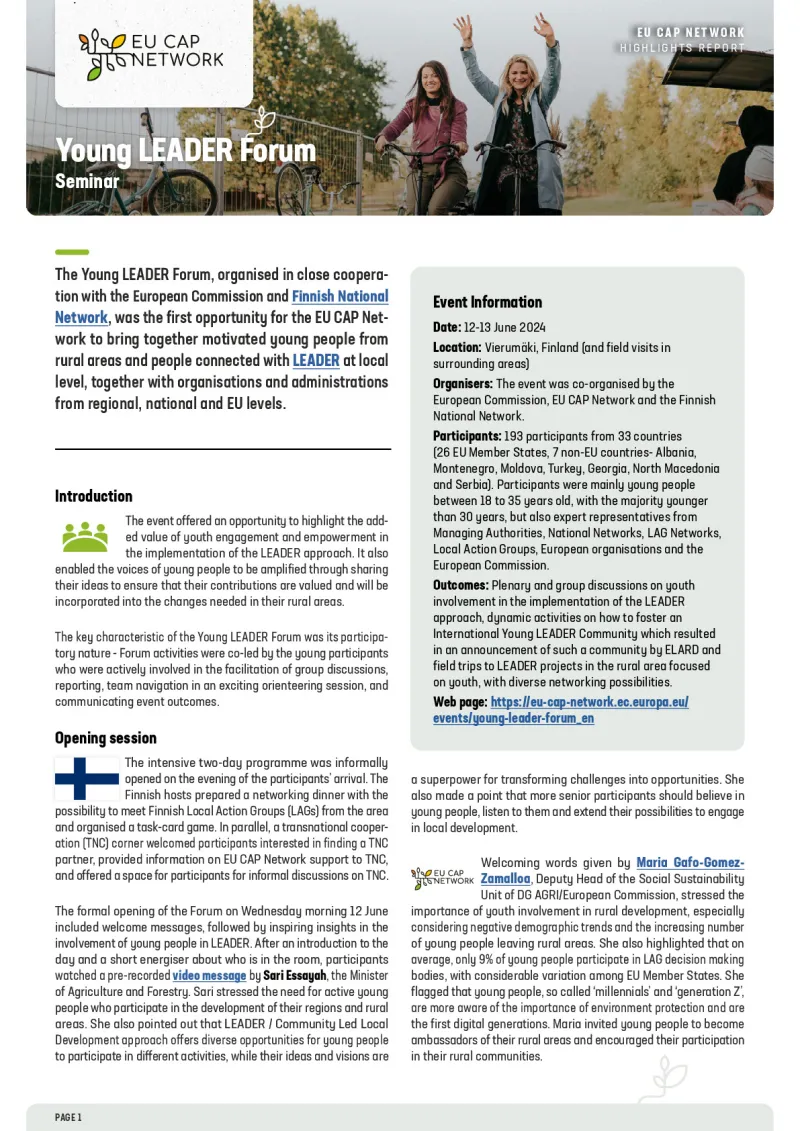EU CAP Network's work on youth: perspectives from young LEADER stakeholders
The involvement of young people in LEADER is not just a question of representation—it is a crucial factor for the long-term sustainability and innovation of rural development.

The involvement of young people in LEADER is not just a question of representation, it is a crucial factor for the long-term sustainability and innovation of rural development. The Young LEADER Forum, held in Vierumäki (Finland) in 2024 and organised by the EU CAP Network, was a starting point in emphasising that young people must be actively engaged in decision-making to ensure the relevance and resilience of rural communities. Among its key recommendations, the Forum called for greater institutional recognition of youth in Local Action Groups (LAGs), the creation of dedicated mentorship and capacity-building programmes, and enhanced networking opportunities for young rural leaders. Embedding youth perspectives into LEADER strategies opens the door to fresh approaches to rural development and strengthens democratic participation.
Youth in LEADER
Recognising existing challenges and opportunities, a concrete step forward has been the establishment of the LEADER Youth Community. The platform, led by ELARD, emerged from the momentum created by the EU CAP Network’s Young LEADER Forum in Vierumäki. While the Community is still in its early stages, with structures and strategies under development, it already plays an important role in fostering connections among young LEADER stakeholders across Europe.
According to Irene Martín, member of the steering committee of the LEADER Youth Community and project officer for the Spanish Network for Rural Development (REDR- in fact, a national LEADER network), the main goal of the Community is to provide a platform where young people can freely discuss their challenges and gain visibility in local decision-making bodies.
One of the key issues identified so far is the struggle for young people involved in LEADER to have proportionate influence. Despite representing 9% of the LEADER decision-making bodies across Europe, many young people find it difficult to have their voices heard. This is where the Community comes in: with knowledge and practice exchange, it aims at equipping young people with the necessary tools to become more active and influential participants in local development processes and institutions, ultimately ensuring a sustainable transition of leadership roles within LEADER.
In less than half a year, the Community has already gathered more than 170 members from 28 countries and is planning to offer a series of training programmes to its members, focusing on increasing youth participation in local institutions, environmental issues, and cultural engagement.
But youth is not just a concern for young people. The group remains open to anyone interested, regardless of age, offering opportunities for experienced individuals to act as mentors and share their expertise in CLLD and decision-making. Whether you are a young person or a person who is young at heart, there is probably a role for you in the Youth in LEADER Community. Consider getting involved!

Nothing about youth without youth
Ensuring that young people have a say in shaping rural policies goes beyond initiatives like the Young LEADER Community. The EU CAP Network has been actively working to amplify youth voices, also creating spaces for them to exchange and discuss. Through Thematic Groups (TGs) and dedicated events, young people engaged in LEADER are encouraged to share ideas, connect with peers across Europe and influence discussions on key topics that are essential for their future. A case in point are the recent TGs on Generational Renewal in Farming and Rural Youth Employment.
The TG on Gen Z - Leading Generational Renewal in Farming, for instance, focused on the role of young people, particularly from Generation Z (people born approximately between the mid-to-late 1990s and the early 2010s), in shaping the future of farming in rural areas. While the primary focus was on generational renewal in agriculture, participants strongly emphasised the role of broader rural communities in supporting and sustaining young farmers.
The TG underscored the need for community engagement as a key factor in the success of young farmers, encouraging initiatives such as public events, training sessions, and local partnerships to promote sustainable practices and foster stronger rural networks. This reflects the recognition that farming is intrinsically linked to the vitality of the wider rural community.
The group worked on possible profiles of ‘future farmers’: tech-savvy, sustainability-driven and entrepreneurial individuals who seamlessly blend modern tools with traditional practices, searching for harmony between sustainability and profitability, between individual interests and community engagement. Young LEADER representatives, by sharing their experiences, play a pivotal role in exploring how cooperation and peer networks, fostered by LAGs, can generate innovative solutions for rural areas.
TG member Aino Kylälehtonen, an 18-year-old student from the Finnish LEADER network Suomen Kylät, shares her experience: “Participating in this TG gave me a much broader picture of agriculture and rural entrepreneurship in Europe. In the first meeting, it was truly eye-opening to hear how similar challenges in agriculture and rural areas are faced across different parts of Europe.”
Similarly, the TG on Rural Youth Employment: The Voice of Rural Youth, which focused on improving employment opportunities for young people in rural areas, addressed issues such as gender gaps and access to services as crucial to create new jobs. TG members involved with LEADER emphasised the importance of local networks, namely LAGs, in creating work opportunities and supporting young entrepreneurs and businesses and shared examples of LEADER-supported initiatives to foster rural youth employment.
For more information and insights, visit the LEADER section of the EU CAP Network’s website, where you can find useful tools, guidance and contacts.
